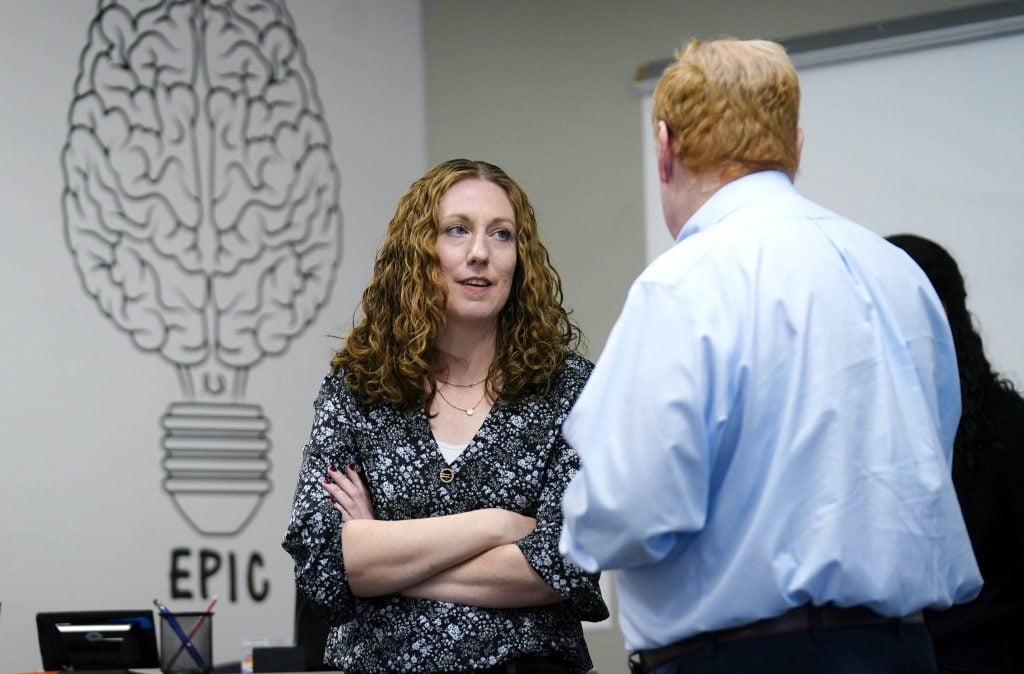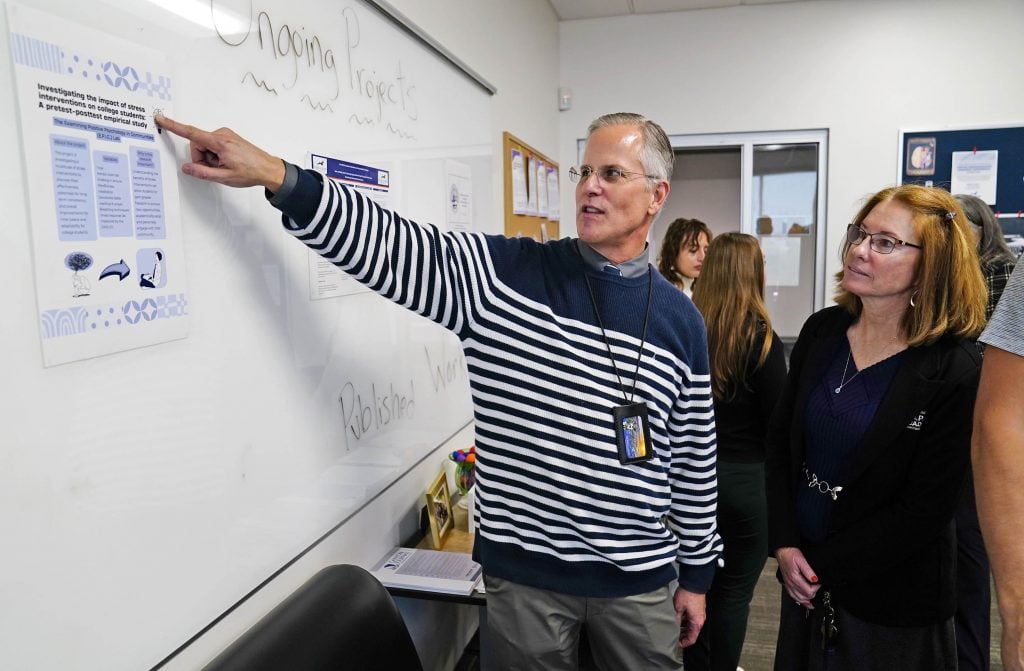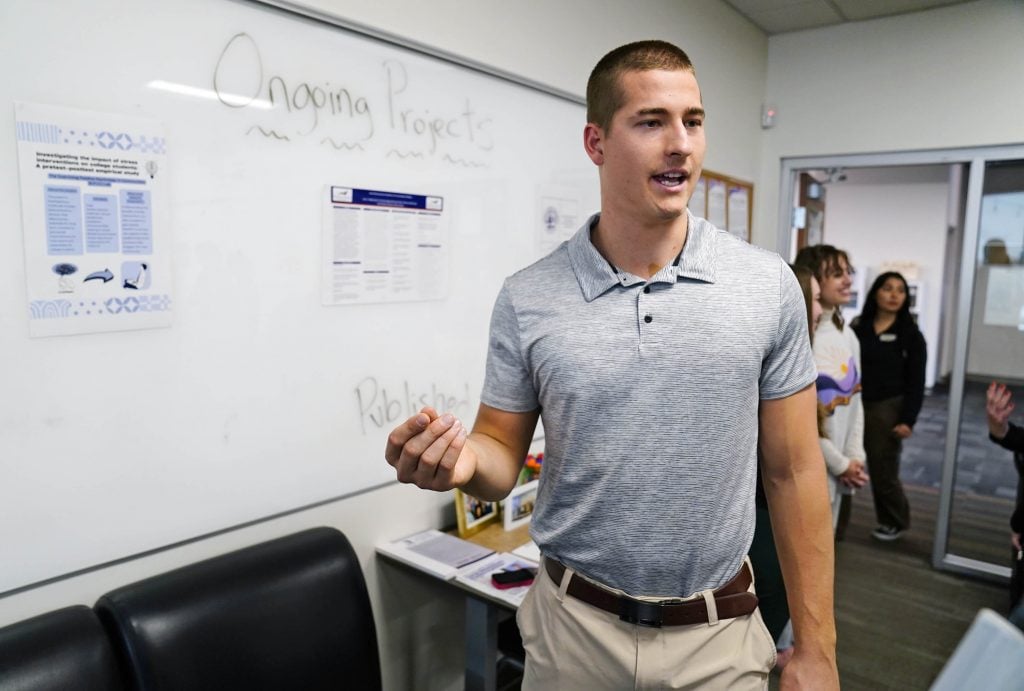
Monday was the open house for EPIC Lab in the College of Humanities and Social Sciences building, but what was already on Room 201’s walls showed that the groundwork has been laid.
There was the mural of a brain in the shape of a lightbulb, signifying the inspiration of mind work being done in a new laboratory dedicated to all undergraduate research, but with an emphasis on positive psychology.
Also, there were papers taped to the wall, research and literature summaries from many of the 20 Grand Canyon University students conducting it.
The lab has been in existence as a nonphysical location since last fall, but now there’s a dedicated space open every day with a computer, brewed coffee with Dr. Eric Peterson’s own roasted beans, and room enough to collaborate. The EPIC Research Club meets there, too.
Already what’s happening here is, to use a trendy modifier, epic.

Psychology major Allison Rogers said that in her team's literature review, soon destined for publication in the Canyon Journal of Undergraduate Research, she learned that the diagnosis of depersonalization/derealization disorder among child survivors of sexual assault has been largely ignored. She hopes to get funding for research that will study if dance can help combat the disorder, a feeling that one is seeing things from outside the body or is not real.
“I grew up dancing. A lot of the girls would dance to process trauma,” she said, versus other forms of play or exercise to heal that detached mind-body connection. “I think the reason is that dance has the emotional aspect, a free agency behind it. I think there is a lot of potential in this research.”
It’s the kind of study that delights psychology professors Peterson and Dr. Magen Branham, who each oversee 10 psychology students in lab research.
“Going into graduate school, it’s super important,” Branham said. “Grad schools are competitive, and anything they can do to differentiate themselves – showing they have research experience in general, and if they are going into the field, research in one area – it really makes them stand out.”
EPIC is an acronym for examining positive psychology in communities.

“There is psychology that looks at deficits, such as people who are depressed, and a deficit is the lens you look at it through,” Peterson said. “Through positive psychology, coined by Dr. Martin Seligman of the University of Pennsylvania in 1998, it’s positive engagement and relationships, or PERMA.”
Another acronym: positive emotions, engagement, relationships, meaning, accomplishment.
“We are looking at ways we operate at the highest level, finding a deep sense of purpose and fulfillment,” Peterson said. “So all the projects have that overriding purpose – how can we help examine things that help individuals have a greater sense of purpose and greater sense of joy.”
How one can find a way forward and be resilient, in spite of trauma. It’s an aspect of psychology that fits with the university mission to help humans flourish.
Some other EPIC Lab studies include Colin O’Reilly’s measures of self-efficacy among Lopes Academy participants before and after going through the program. O’Reilly is the president of the EPIC Research Club and has found the new space vital to consort with other students working on the research or to hold club meetings.
Sophomore Logan Demeter said he is part of a research project that is studying whether religious identity provides a buffer between athletic identity and stress in college athletes when they perceive their performance to be lacking.

And senior Kobe Lage described his literature review of what interventions could impact stress in college students, such as yoga, meditation, walking in nature, etc.
“I was happy to work on this subject,” he said. “I hope to be a life coach, and it would be something that helps in my practice and helps other people.”
The lab’s largest endeavor, Branham’s “The Awe Project,” is conducted with student input and assistance.
“Awe is a feeling of being confronted with something that is expansive and doesn’t quite fit within your framework of understanding,” Branham said, looking for ways to harness and apply awe for psychological benefit.
They plan to use virtual reality in the next step of the research, which could be positively epic.
Grand Canyon University senior writer Mike Kilen can be reached at [email protected]
***
Related content:
GCU News: Positive psychology one of the pluses at undergraduate research symposium
GCU News: After tragedy, alumna sought change from inside as probation officer



































































